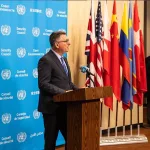Ministry of Health Publishes Winter Preparation Plan
Ministry of Health publishes winter preparation plan to combat expected illnesses, including increased staffing and widespread vaccinations. Protecting at-risk
Jerusalem, 28 October, 2025 (TPS-IL) — Israel’s Ministry of Health published today its preparedness plan for the upcoming winter, in order to “ensure the best response to the expected winter illness.”
The circular is published every year by the head of the Medical Division, Dr. Hager Mizrahi, to all health institutions in the State of Israel, including hospitals, according to which hospitals are required to increase the staffing in the ICU and internal departments, as well as in supporting systems such as imaging laboratories, in order to reduce workloads during the winter months.
The preparedness required of the health system focuses on protecting at-risk populations, reducing hospital workloads, and promoting widespread vaccinations against the main winter viruses – influenza, coronavirus, and RSV. Medical teams are instructed to wear masks whenever they encounter at-risk populations, and health workers with symptoms of illness are asked not to come to work for at least five days.
As part of the health system’s preparations, emphasis has also been placed on geriatric institutions and the protection of the elderly, with health funds providing vaccinations to residents of geriatric institutions and the vaccination taking place in the institution itself. Employees of geriatric institutions will also be vaccinated in these institutions to ensure high vaccination rates
The geriatric hospitalization system in hospitals will be strengthened, and new arrangements have been made for releasing patients for continued treatment in an active geriatric setting or in home hospitalization. In addition, the medications required for the treatment of the elderly – including treatments against influenza and COVID-19 – will be provided by the health funds in accordance with new arrangements with the institutions.























